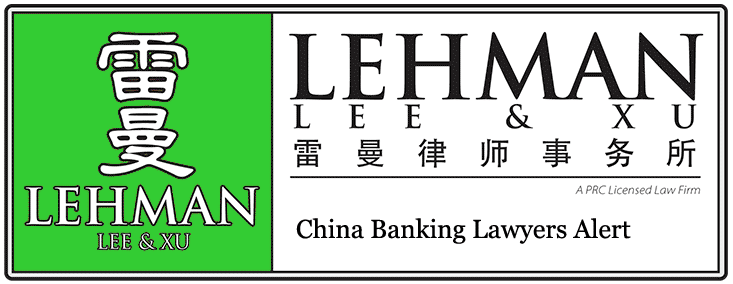
August 4, 2013

 |
|
LEHMAN, LEE & XU China Lawyers
|
|
China Banking Lawyers Alert
|
|
August 4, 2013
|
The China Law News keeps you on top of business, economic and political events in the China. |
|
|
|
In the News |
PBOC rules facilitating cross-border RMB settlement |
SPEED READ On 5 July 2013, the People’s Bank of China (PBOC) issued its Circular on Streamlining Cross-Border RMB Business Procedures and Improving Relevant Policies (中国人民银行关于简化跨境人民币业务流程和完善有关政策的通知) (the Circular). With the promulgation of the Circular, the PBOC intends to improve the efficiency of cross-border RMB settlement and facilitate the use of RMB for the settlement of cross-border transactions. The Circular sets out policies and procedures relating to cross-border RMB settlement for certain transactions, including cross-border trades, bank-card RMB-account-related transactions, cross-border lending in RMB, issuance of RMB bonds overseas by PRC corporates, the provision of RMB security in favour of offshore entities by PRC corporates and the issuance of RMB bonds overseas by PRC corporates etc. For the purposes of this eAlert, PRC or China refers to the People’s Republic of China (excluding Hong Kong, Taiwan and Macau). The term PRC banks means banks organised in the PRC with the approval of the China Banking Regulatory.??? KEY PROVISIONS OF THE CIRCULAR (1) Non-financial institutions incorporated in the PRC (PRC corporates) may apply to PRC banks for outbound lending in RMB. PRC corporates which operate within the same company group may apply to PRC banks for RMB cash-pooling business whereby the PRC corporates may lend in RMB to their offshore affiliates. (2) PRC banks provide cross-border RMB-settlement services for the outbound lending mentioned above after review of the application documents submitted by the PRC corporate. (3) PRC corporates are required to open a special RMB deposit account for the purposes of outbound lending. (4) The interest rate, tenor and purposes of the loan can be agreed by the lender and borrower in light of commercial principles and on a reasonable basis. (5) The repayment of the loan is to be made in RMB into the special RMB deposit account, and the amount of the repayment shall not exceed the aggregate of the principal, interest, PRC income tax and relevant expenses. (6) PRC banks shall report relevant information on the loans, related cross-border payments and RMB guarantees (if any) to the RCPMIS (an online system of the PBOC to monitor cross-border RMB fund flows).? WHAT'S NEW The Circular allows PRC corporates (whether incorporated in Shanghai or otherwise) to lend in RMB to offshore entities. GENERAL COMMENTS The provisions are very general – and there are a number of questions to be clarified by PBOC, for example: ? Are there any restrictions on the source of funding for the loans (eg borrowing from banks, proceeds of bonds)?
Provision of cross-border RMB security by PRC corporate KEY PROVISIONS OF THE CIRCULAR (2) Upon enforcement of the RMB security, PRC banks may provide RMB settlement services (ie remittance of enforcement proceeds out of China) after verifying the authenticity of the transactions. Following the remittance of the proceeds, PRC banks shall report to the RCPMIS. (3) Alternatively, the PRC corporate may use the RMB funds it retains offshore to perform its obligations upon enforcement of the RMB security. WHAT'S NEW Under the current SAFE regime on foreign security, a PRC corporate shall obtain a prior approval or quote from SAFE before it can provide foreign security. The foreign security shall be registered with SAFE on a case- by-case basis. The security may be provided by the PRC corporate to secure the obligation of its downstream affiliates only. Enforcement of the guarantee is subject to SAFE approval. We understand that in 2012 PBOC issued a letter in response to consultation by two banks, stating that PRC banks may provide a financial-type foreign guarantee dominated in RMB and such guarantee would not be required to be included in the calculation of the foreign security quota of the bank. It also states that no approval or registration is required for financial-type foreign security provided by PRC banks (note that under SAFE regulations, PRC banks shall provide financial-type foreign security with its annual quota and the security shall be registered with SAFE on a monthly basis). Under the Circular, PRC corporates may provide RMB security in favour of offshore entities. Enforcement of the RMB security is not subject to any prior approval. Although it is not clearly articulated, the Circular seems to suggest that the RMB security provided by PRC corporates is not subject to any approval, quota or registration. The Circular also allows PRC corporates to use offshore RMB funds to perform their obligations upon enforcement. It is likely that PRC corporates will retain RMB funds offshore if proceeds are from Dim Sum bonds or cross-border RMB-trade settlement. GENERAL COMMENTS A question remains whether the RMB security provided by PRC corporates in favour of foreign entities shall comply with SAFE requirements for foreign security (eg approval, quota and registration and restrictions on repatriation where offshore debts are backed by onshore guarantee) and what the consequences will be in the event of non-compliance. It is also to be clarified by PBOC what would constitute a RMB security (e.g. cash in RMB, assets denominated in RMB or performance in RMB upon enforcement?) Issuance of RMB bonds overseas by PRC corporates KEY PROVISIONS OF THE CIRCULAR (1) PRC corporates may open a special RMB deposit account with a PRC bank for the purpose of retaining the bond proceeds which are repatriated from offshore, with the consent of the PBOC. The use of bond proceeds shall be in strict compliance with the bond prospectus. (2) PRC banks are required to report relevant information (including remittance of bond proceeds into China, repayment of the bonds and provision of any RMB guarantee) to the RCPMIS. WHAT'S NEW There is clarification that the repatriated bond proceeds shall be placed in a special RMB account. This facilitates the account bank in its monitoring of the use of funds. GENERAL COMMENTS According to the regulation of the National Development and Reform Commission (NDRC), PRC corporates are required to apply for NDRC approval before issuing RMB bonds overseas. When submitting the application, PRC corporates shall specify whether the bond proceeds will stay offshore or be repatriated for use in China. The NDRC regulation is not clear as to whether PBOC approval is required for the repatriation of bond proceeds. The Circular seems to suggest that repatriation of bond proceeds into China will need PBOC consent. However, it remains to be clarified as to whether the PBOC consent will be issued separately or deemed to be given if NDRC approval is granted (note that NDRC will consult with relevant authorities (presumably including PBOC) according to the NDRC regulation). Other The Circular simplifies the procedures for cross-border RMB trade settlement. PRC banks may conduct settlement (ie by making and receiving payments) for the PRC corporate upon the PRC corporate presenting the payment instruction, with certain exceptions. PRC banks may also allow the PRC corporate to make/receive payments under current account items prior to the relevant PRC bank’s verification of underlying transactions (note that verification of the underlying transactions is usually a precondition for cross-border remittance). In particular, PRC banks are encouraged to provide cross-border trade finance in RMB and may conduct cross-border transfer business that relates to trade finance assets. The Circular also sets out principles in relation to the cross-border settlement of credit-card-related RMB- account transactions. In particular, for overseas consumption or cash withdrawal via RMB-denominated bank cards issued by PRC banks, the PRC issuing banks shall settle in RMB with a “PRC bank card clearing institution” (eg UnionPay), which will then settle in RMB or FX with the offshore acquiring banks. For onshore consumption or cash withdrawal via bank cards issued by offshore banks, the onshore acquiring banks shall settle in RMB with a PRC bank card clearing institution, which will then settle in RMB with the offshore issuing banks. This indicates that cross-border settlement of RMB bank card transactions must be conducted through a PRC-licensed payment institution (eg UnionPay). General comment The Circular may have a significant impact on the structure of cross-border transactions in various respects. For example, access to onshore liquidity in RMB has been made easier. Allowing PRC corporates to provide cross-border RMB security directly will diversify credit- enhancement options for Dim Sum bonds or other cross-border finance transactions. Having said that, as many provisions in the Circular have been drafted in a very general manner, it remains to be seen how these general rules will be implemented in the future.?
|